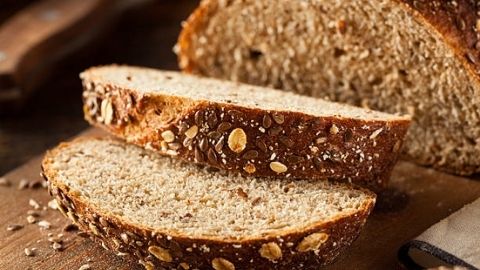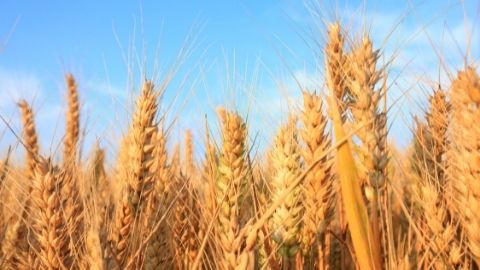Adopting Organic Wheat: Grower Motivations and Concerns
Introduction
In recent years, the demand for organic products has increased rapidly. The Organic Trade Association found the percentage share of at-home organic food purchases in 2015 had more than doubled since 2005 to 5% of the total share and organic retail sales in the U.S. were $43.3 billion in 2015 (USDA-ERS, 2017). For organic wheat products, such as bread and baked goods, the demand currently exceeds the supply (Koory, 2018). With the increasing demand for organic wheat flour, Ardent Mills, a major supplier of flour in North America, is now attempting to meet the demand with its Organic Initiative 2019 (Ardent Mills, 2015). The initiative will assist growers with adoption of organic wheat and the associated concerns.
However, a recent study of wheat producers in the western United States found that wheat growers were actually transitioning out of organic production due to concerns about pest control and profitability (Curtis and Quarnstrom, 2019). Growers that had adopted organic methods did so due to the potential profit and their personal values at the time of transition. This fact sheet provides an overview of the study results by discussing grower motivations for adopting organic methods, as well as grower concerns regarding organic production.
Study Overview
 The study conducted an online survey of wheat producers in 14 western states, via various farming and grain growers' associations. The survey contained questions relating to grower socio-demographics, farm characteristics, history of production practices, trusted information sources, and concerns about organic production and implementing new technologies on their farm. Surveys were given to both conventional and organic wheat growers, and 82 valid responses were provided. The majority of the respondents were from Utah (30) and Colorado (20), followed by Montana (10) and Washington (9).
The study conducted an online survey of wheat producers in 14 western states, via various farming and grain growers' associations. The survey contained questions relating to grower socio-demographics, farm characteristics, history of production practices, trusted information sources, and concerns about organic production and implementing new technologies on their farm. Surveys were given to both conventional and organic wheat growers, and 82 valid responses were provided. The majority of the respondents were from Utah (30) and Colorado (20), followed by Montana (10) and Washington (9).
Of the 82 grower respondents, 64 used conventional methods, 13 used organic methods, seven of which were certified organic, and five combined conventional and organic with two certified, see Figure 1. Of those that used conventional methods, two started with organic practices and switched over, and four previously farmed both conventional and organic wheat, but are now exclusively conventional.
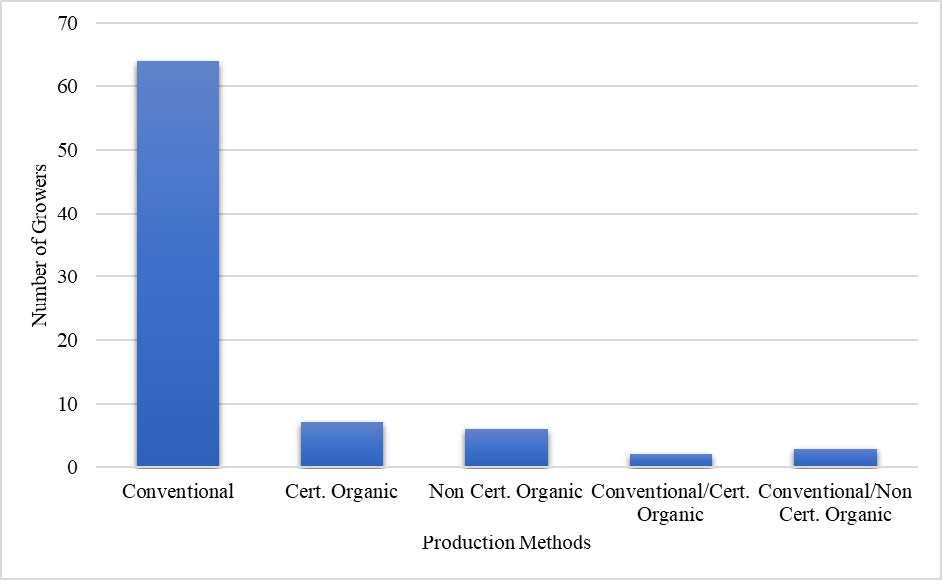
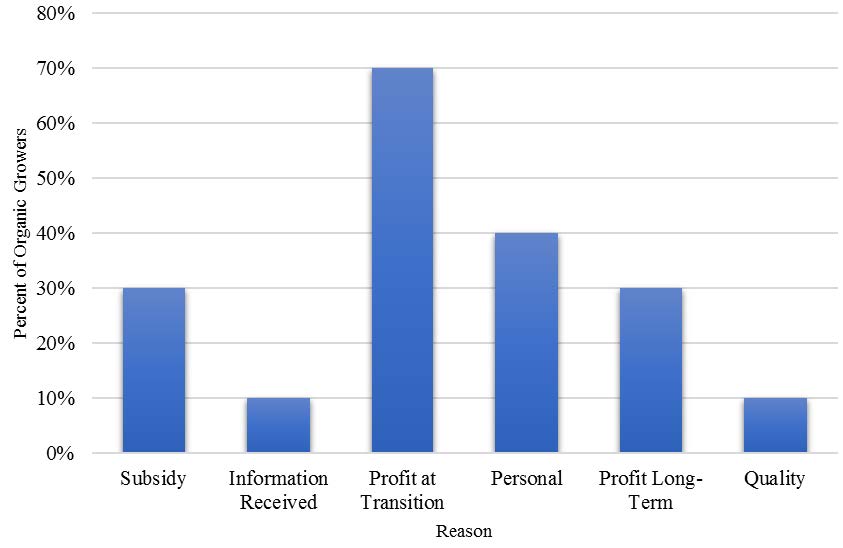
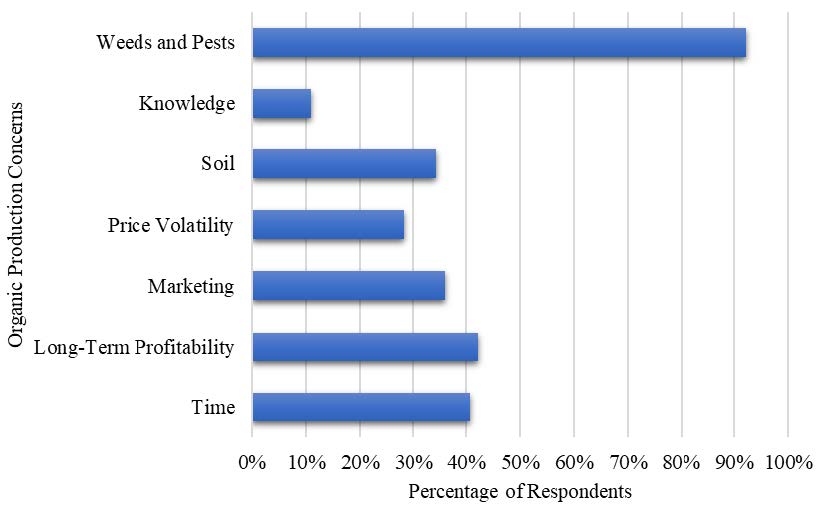
Why Go Organic?
Organic wheat growers were asked about their reasons for adopting organic practices, 70% responded that they were motivated by the profit potential at transition, see Figure 2. Approx. 40% of the growers were motivated by their personal beliefs, such as the health or environmental impact. Long-term profit and receiving a subsidy were tied at 30%. Other reasons given included continually rising input costs and the need for a more efficient way to kill herbicide-resistant weeds in conventional systems. Overall, growers were motivated to adopt organic practices due to the potential profits, either through subsidy or price premiums. Additionally, many organic growers have personal values which place an emphasis on an organic lifestyle, environmental protection concerns, and/or believing organic production methods result in higher quality products (Padel, 2008).
What Hinders Organic Adoption?
When wheat growers were asked about their concerns regarding organic farming, the most common response was weed and pest control (92%). Next was the concern for long-term profitability in organic farming (42%), followed by the time required to certify (41%), marketing (36%), and soil impacts (34%). Only 28% of growers were concerned about the actual volatility of organic premiums. Additional concerns included the hassle of protecting organic products from exposure to chemicals, especially upon delivery and storage, and the impact of the production practices on neighboring farms (see Figure 3).
Other studies have found that barriers to producer adoption of organic farming methods include lack of production knowledge, higher cost of inputs, transition costs, concerns regarding weed and pest control, potential volatility of organic premiums, access to markets, and perceived risk (Nelson et al., 2015; McBride et al., 2015). Despite increasing demand, and the fact that organic goods are one of the fastest growing food segments, growers are slower to adopt than would be expected. Adoption barriers are often overcome through educating growers on organic production methods, government grants (policy incentives), and the profit margins gained through organic premiums.
The wheat growers were also asked what factors discourage new technology adoption, in general, on their farm. The number one factor was the cost or expense of implementing the change, followed by the time required, and then knowledge or training they would need to properly implement the technology (see Table 1).
Table 1: Factors Discouraging Technology Adoption
| Factor | Percentage of Respondents |
|---|---|
| Time | 14.29% |
| Cost/expense | 37.89% |
| Knowledge | 15.53% |
| Percieved risk | 15.53% |
| Financing | 12.42% |
| None | 1.24% |
| Other | 3.11% |
Conclusions
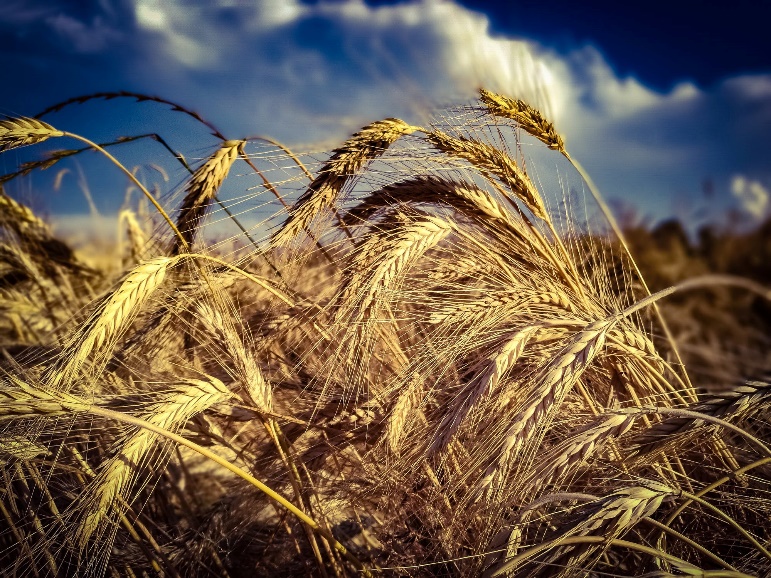
This fact sheet discussed organic wheat grower motivations for adopting organic methods, as well as grower concerns regarding organic production and implementing new technologies. The study found that current organic wheat producers were motivated to adopt organic methods due to the profit potential and personal values at the time of transition. While these producers may be more motivated by altruistic ideals, obviously profitability is also a major concern. Federal or local policies which provide subsidies or other incentives to dampen the financial burden of transition and improve the profitability potential may be effective in increasing the adoption of organic wheat to fill rising consumer demand.
References
- Ardent Mills (2015, December 15). Ardent Mills to Help Farmers Double U.S. Organic Wheat Acres by 2019. PR Newswire. Retrieved from https://www.prnewswire.com/news-releases/ardent-mills-to-help-farmers-double-us-organic-wheat-acres-by-2019-300192784.html.
- Curtis, K., and Quarnstrom, D. (2019). Untangling the Economic and Social Impediments to Producer Adoption of Organic Wheat. Journal of Food Distribution Research, 50(1), 105-113.
- Koory, R. (2018). Yields Hold Potential Boon for 2018 Organic Wheat Production. The Organic and Non-GMO Report. Retrieved from http://non-gmoreport.com/articles/yields-hold-potential-boon-for-2018-organic-wheat-production/.
- McBride, W.D., Greene, C., Ali, M., and Foreman, L. (2015). The Profit Potential of Certified Organic Field Crop Production. United States Department of Agriculture Economic Research Service., Economic Research Report Number 188, 1-46.
- Nelson, M., Styles, E., Pattanaik, N., Liu, X., and Brown, J. (2015). Georgia Farmers’ Perceptions of Production Barrier in Organic Vegetable and Fruit Agriculture. Presented at the Southern Agricultural Economics Association, Atlanta, GA, 2015. Retrieved from https://ageconsearch.umn.edu/bitstream/196868/2/Final%20SAEA-Organic%20Production-%20Barrier%20Paper.pdf
- Padel, S. (2008). Values of Organic Producers Converting at Different Times: Results of a Focus Group Study in Five European Countries. International Journal of Agricultural Resources, Governance and Ecology, 7(1-2), 63-77.
- U.S. Department of Agriculture, Economic Research Service (USDA-ERS). 2017. Organic Market Overview. Washington, DC. Retrieved from https://www.ers.usda.gov/topics/natural-resources-environment/organic-agriculture/organic-market-overview/
Date Published: May 2019
Authors
Kynda R. Curtis, Professor and Extension Specialist, Department of Applied Economics; Emily Rice, Undergraduate Extension Intern, Department of Applied Economics; Donya L. Quarnstrom, Graduate Student, Department of Applied Economics
Related Research



